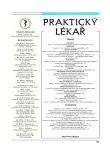-
Medical journals
- Career
Current opinion on perindopril clinical efficacy: a review
Authors: R. Honzák
Authors‘ workplace: Ústav všeobecného lékařství 1. LF UK, Praha přednosta MUDr. B. Seifert ; Psychiatrická ambulance IKEM, Praha ředitel prof. ing. R. Poledne, CSc. ; Psychiatrická katedra IPVZ, vedoucí prof. MUDr. K. Chromý, CSc.
Published in: Prakt. Lék. 2005; 85(9): 508-512
Category: Therapy
Overview
Perindopril is a long-acting, once-daily lipophilic angiotensin-converting enzyme inhibitor with high tissue angiotensin-converting enzyme affinity, lowering angiotensin II and potentiating bradykinin. Its efficacy, safety and tolerability are well established in the treatment of hypertension and heart failure. Recent studies in patients with hypertension and coronary artery disease and experimental animal studies have suggested that perindopril may have benefits beyond blood pressure reduction alone. Treatment with perindopril reduces and prevents cardiovascular diseases, whether hypertensive or not, reduces central aortic stiffness and central pulse pressure, and can improve arterial elasticity and hence risk of cardiovascular complications even in normotensive diabetics. Perindopril could improve cardiac function of failing heart through directly enhancing the contractility of single cardiomyocyte. In addition to its other benefical effects, such as improved endothelial function and decreased inflammation, these hemodynamic effects of perindopril may contribute to the decrease in cardiovascular events in several epidemiological studies. The blood pressure reduction by an early ACE inhibition is associated with an improvement of renal function. Antihypertensive therapy has been shown to reduce the incidence or recurrence of stroke, probably preventing vascular dementia. Recent animal studies suggested that the combination treatment with interferon-beta and perindopril may be an effective strategy for anti-liver fibrosis therapy and chemoprevention against hepatocellular carcinoma.
Key words:
angiotensin-converting enzyme inhibitor – perindopril – hypertension – ischaemic heart disease – diabetes mellitus – stroke – vascular dementia – nephropathy – liver fibrosis – hepatocellular carcinoma – EUROPA – PERTINENT – PERSUADE – PROGRESS – REASON.
Labels
General practitioner for children and adolescents General practitioner for adults
Article was published inGeneral Practitioner

2005 Issue 9-
All articles in this issue
- Shoa – Cyklon B – cyanide intoxication
- International healthcare projects of sexually transmitted infections prevention in prostitutes in the Czech Republic
- Substitution therapy with buprenorphin at the AT out-patient department in České Budějovice
- Laparoscopic bandaging of the stomach in the struggle against obesity
- Malignant hypertension as a serious complication of aortic coarctation diagnosed in advanced age
- The importance of identifying dysmorphophobia
- Current opinion on perindopril clinical efficacy: a review
- General Practitioner
- Journal archive
- Current issue
- Online only
- About the journal
Most read in this issue- The importance of identifying dysmorphophobia
- Shoa – Cyklon B – cyanide intoxication
- Malignant hypertension as a serious complication of aortic coarctation diagnosed in advanced age
- Laparoscopic bandaging of the stomach in the struggle against obesity
Login#ADS_BOTTOM_SCRIPTS#Forgotten passwordEnter the email address that you registered with. We will send you instructions on how to set a new password.
- Career

